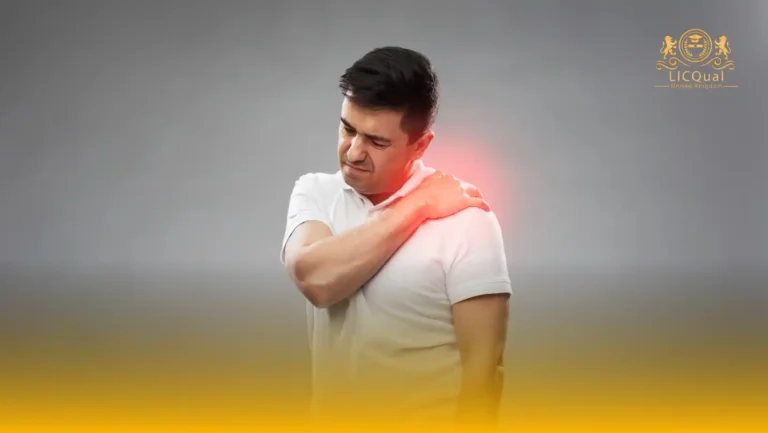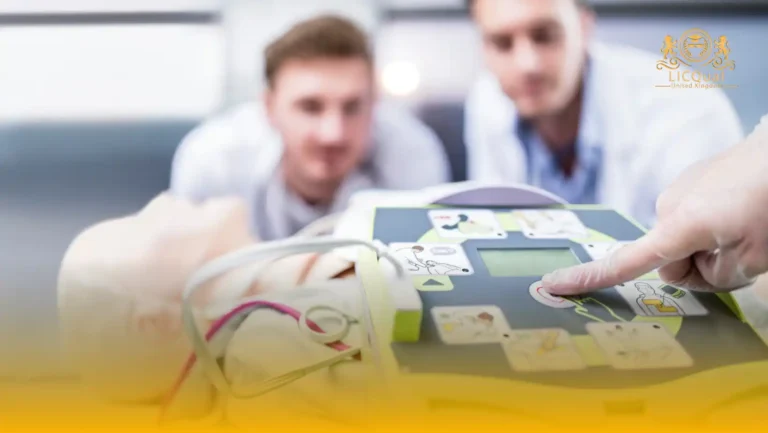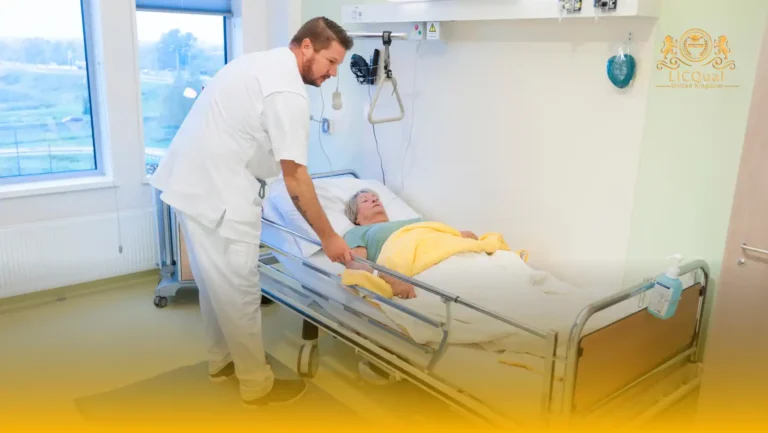The LICQual Level 3 Diploma in Respiratory Medicine (Dip RM) is a specialised qualification designed for healthcare professionals who are already practising in the medical field and wish to deepen their expertise in the management and treatment of respiratory conditions. This diploma is not intended for fresh candidates but is aimed at experienced practitioners who want to enhance their career prospects, expand their knowledge, and strengthen their Continuing Professional Development (CPD).
Respiratory medicine is a critical area of healthcare, addressing conditions such as asthma, chronic obstructive pulmonary disease (COPD), tuberculosis, pneumonia, and emerging respiratory infections. With the increasing global burden of respiratory diseases, there is a strong demand for skilled professionals who can deliver effective patient care, implement evidence-based practices, and contribute to improved healthcare outcomes. This qualification equips learners with the clinical, diagnostic, and management skills needed to excel in respiratory medicine across hospital, community, and specialist care settings.
Centres delivering this diploma must ensure the highest standards of teaching and learning. Training should be supported by qualified and competent staff, alongside access to modern learning resources, case studies, and relevant clinical materials. Centres are also expected to provide structured learner support and maintain a strong focus on quality assurance to ensure academic integrity and professional success.
By completing this qualification, learners will not only enhance their specialist skills in respiratory medicine but also position themselves for career progression and recognition within the healthcare sector.
Course Overview
Qualification Title
LICQual Level 3 Diploma in Respiratory Medicine (Dip RM)
Total Units
6
Total Credits
60
GLH
240
Qualification #
LICQ2200899
Qualification Specification
To enroll in the LICQual Level 3 Diploma in Respiratory Medicine (Dip RM), applicants must meet the following criteria:
|
Qualification# |
Unit Title |
Credits |
GLH |
|---|---|---|---|
|
LICQ2200899-1 |
Fundamentals of Respiratory Medicine |
10 |
40 |
|
LICQ2200899-2 |
Anatomy, Physiology, and Pathophysiology of the Respiratory System |
10 |
40 |
|
LICQ2200899-3 |
Diagnostic Methods and Clinical Assessment in Respiratory Medicine |
10 |
40 |
|
LICQ2200899-4 |
Management of Common Respiratory Disorders |
10 |
40 |
|
LICQ2200899-5 |
Pharmacological and Non-Pharmacological Interventions in Respiratory Care |
10 |
40 |
|
LICQ2200899-6 |
Public Health, Preventive Strategies, and Ethical Practice in Respiratory Medicine |
10 |
40 |
By the end of this course, learners will be able to:
Unit 1: Fundamentals of Respiratory Medicine
- Explain the scope and importance of respiratory medicine in healthcare.
- Recognise common respiratory diseases and their impact on patient health.
- Describe the principles of patient-centred care in respiratory practice.
- Understand the role of healthcare professionals in promoting respiratory health.
Unit 2: Anatomy, Physiology, and Pathophysiology of the Respiratory System
- Describe the structure and function of the respiratory system.
- Explain the physiological processes involved in breathing and gas exchange.
- Analyse pathophysiological changes in common respiratory conditions.
- Understand the interaction between systemic diseases and respiratory function.
Unit 3: Diagnostic Methods and Clinical Assessment in Respiratory Medicine
- Conduct patient history taking and physical examination specific to respiratory care.
- Interpret laboratory tests, imaging, and pulmonary function tests.
- Apply evidence-based approaches to differential diagnosis of respiratory conditions.
- Evaluate the use of diagnostic tools in monitoring disease progression.
Unit 4: Management of Common Respiratory Disorders
- Differentiate between acute and chronic respiratory conditions.
- Outline treatment plans for asthma, COPD, pneumonia, tuberculosis, and other common respiratory disorders.
- Recognise the role of lifestyle modification, patient education, and rehabilitation in respiratory care.
- Apply clinical guidelines to improve patient outcomes in respiratory medicine.
Unit 5: Pharmacological and Non-Pharmacological Interventions in Respiratory Care
- Explain the mechanisms of common respiratory medications and their clinical applications.
- Evaluate non-pharmacological interventions such as physiotherapy, oxygen therapy, and pulmonary rehabilitation.
- Develop personalised care plans integrating both pharmacological and non-pharmacological approaches.
- Monitor patient responses to interventions and adjust care plans accordingly.
Unit 6: Public Health, Preventive Strategies, and Ethical Practice in Respiratory Medicine
- Explain the principles of public health relevant to respiratory medicine.
- Analyse preventive strategies including vaccination, health promotion, and disease control measures.
- Understand ethical considerations, patient confidentiality, and informed consent in respiratory care.
- Demonstrate professional standards and reflective practice to support continuing professional development (CPD).
The LICQual Level 3 Diploma in Respiratory Medicine (Dip RM) is designed for healthcare professionals, medical graduates, and allied practitioners who want to specialize in the diagnosis, treatment, and management of respiratory diseases. This internationally recognized diploma is ideal for those seeking CPD accreditation, career advancement, and flexible online training that prepares them to deliver evidence-based care for patients with asthma, COPD, pneumonia, and other pulmonary conditions.
1. Medical Doctors and Physicians
- Strengthen diagnostic and treatment skills in respiratory medicine
- Gain advanced knowledge of asthma, COPD, and pneumonia management
- Apply evidence-based approaches to pulmonary care
- Improve patient outcomes with specialized respiratory training
- Enhance professional credibility with an accredited diploma
2. Nurses and Clinical Practitioners
- Develop expertise in managing patients with chronic and acute lung diseases
- Learn patient-centered care strategies for respiratory conditions
- Expand clinical scope with a Diploma in Respiratory Medicine (Dip RM)
- Access CPD-accredited training for career progression
- Gain confidence in supporting multidisciplinary respiratory care teams
3. Allied Health Professionals
- Suitable for physiotherapists, respiratory therapists, and pharmacists
- Understand the role of rehabilitation and medication in lung health
- Support patients with long-term respiratory conditions
- Strengthen interprofessional collaboration in healthcare delivery
- Add a specialized qualification to enhance career opportunities
4. Medical Graduates and Postgraduate Students
- Build a strong foundation in respiratory medicine for future specialization
- Gain a competitive edge in postgraduate medical applications
- Access flexible online learning while continuing clinical rotations
- Learn from expert-led modules aligned with international standards
- Earn a diploma that strengthens both academic and professional profiles
5. Public Health Specialists and Epidemiologists
- Understand the global impact of respiratory diseases on healthcare systems
- Gain insights into prevention, screening, and disease control strategies
- Learn surveillance methods for respiratory infections and outbreaks
- Strengthen leadership skills in public health policy and planning
- Contribute to international health initiatives and research
6. International Healthcare Professionals
- Designed for global learners seeking UK-accredited qualifications
- Access flexible online study from anywhere in the world
- Gain recognition with an internationally respected diploma
- Learn best practices in respiratory medicine aligned with global standards
- Enhance employability in hospitals, clinics, and global health organizations
7. Professionals Seeking Career Advancement
- Ideal for those aiming to specialize in respiratory medicine
- Boost career growth with a niche medical qualification
- Gain recognition for advanced clinical expertise in pulmonary care
- Open pathways to leadership, teaching, and research roles
- Strengthen your CV with a Diploma in Respiratory Medicine (Dip RM)
Centres delivering the LICQual Level 3 Diploma in Respiratory Medicine (Dip RM) must meet high academic and professional standards to ensure learners receive high-quality training and achieve successful outcomes. Requirements include:
- Qualified and Competent Staff – Trainers and assessors must hold recognised qualifications in respiratory medicine, healthcare, or related clinical disciplines, with practical experience in patient care.
- Appropriate Learning Facilities – Centres must provide classrooms, access to clinical environments or simulation facilities, and digital resources to support both theoretical and practical learning.
- Comprehensive Learning Resources – Up-to-date textbooks, journals, e-learning platforms, and case studies relevant to respiratory medicine should be available.
- Robust Assessment Systems – Centres must implement fair, reliable, and valid assessment methods, including written assignments, case studies, and applied clinical evaluations.
- Internal Quality Assurance (IQA) – A structured quality assurance process must ensure consistent teaching, assessment, and learner support.
- Learner Support Services – Guidance, mentoring, and academic support must be provided to help learners achieve their full potential.
- Technology and Digital Access – Centres should offer online learning tools, assessment platforms, and access to e-resources to enhance flexibility and accessibility.
- Compliance with LICQual Standards – All delivery must adhere to LICQual’s policies on quality, safeguarding, equality, and inclusion.
- Accurate Record Management – Centres must maintain secure learner records, assessment results, and certification documentation in line with regulatory and audit requirements.
Assessment and Verification
All units within this qualification are subject to internal assessment by the approved centre and external verification by LICQual. The qualification follows a criterion-referenced assessment approach, ensuring that learners meet all specified learning outcomes.
To achieve a ‘Pass’ in any unit, learners must provide valid, sufficient, and authentic evidence demonstrating their attainment of all learning outcomes and compliance with the prescribed assessment criteria. The Assessor is responsible for evaluating the evidence and determining whether the learner has successfully met the required standards.
Assessors must maintain a clear and comprehensive audit trail, documenting the basis for their assessment decisions to ensure transparency, consistency, and compliance with quality assurance requirements.







